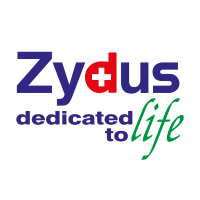Zydus seeks DCGI approval for the use of Pegylated Interferon alpha-2b in treating COVID-19
Promising Interim results from Phase III clinical trials with Pegylated Interferon alpha-2b in COVID-19 show higher clinical improvement 91.15% of patients treated with PegIFN were RT PCR negative by day 7 as compared to 78.90%

Promising Interim results from Phase III clinical trials with Pegylated Interferon alpha-2b in COVID-19 show higher clinical improvement
- 91.15% of patients treated with PegIFN were RT PCR negative by day 7 as compared to 78.90% on the standard of care (SOC) arm.
- PegIFN reduced the duration for supplemental oxygen to 56 hours from 84 hours in moderate COVID-19 patients
- A single dose of PegIFN administered early on shows high clinical improvement in patients
- Findings are in line with the research papers published in internationally reputed publications – Nature and Science
- Company has applied for an Additional Indication with the DCGI for the use of PegIFN in the treatment of COVID 19.
Zydus Cadila announced that its Phase III clinical trials with Pegylated Interferon Alpha 2b, PegiHepTM has shown promising results in treating COVID-19. In what could be a breakthrough in the disease management of COVID-19, the interim results indicate that PegIFN when administered early on, could help patients recover faster and avoiding much of the complications seen in the advanced stages of the disease. PegIFN in COVID19 has several add-on advantages compared to other anti-viral agents. The treatment regimen would be less cumbersome and more affordable for patients as Pegylated Interferon Alpha 2b, is a single dose regimen. It would also ensure better compliance. PegIFN has very well-established safety with multiple doses in chronic hepatitis B and C patients since many years. Patients on Pegylated Interferon Alpha 2b during the trial also showed lesser need for supplemental oxygen, clearly indicating that it was able to control respiratory distress and failure which has been one of the major challenges in treating COVID-19. The findings are in line with recently reported importance of early IFN treatment given in combination with steroids in the treatment of COVID-19 (Lu et al, Signal Transduction and Targeted Therapy (2021) 6:107, a Nature publication. With these positive results, the Company has applied for an approval for additional indication with the DCGI for the use of PegIFN in the treatment of COVID 19.
Pegylated Interferon Alpha 2b therapy has been very well-established safety with multiple doses being administered in chronic hepatitis B and C patients since many years. Type I interferons including Interferon alpha have been found crucial in the protection against SARS-CoV-2 in the recent publications in the leading journal Science (Hadjadj et al, Bastard et al and Zhang et al).
Aging reduces the body’s ability to produce Interferon Alpha in response to viral infections and may be associated with higher mortality in elderly patients. Pegylated Interferon Alpha 2b given early during infection can replace this deficiency and aid a faster recovery process. The Phase III trials were conducted on 250 patients across 20-25 centres in India and the detailed results of this will be published in a peer-reviewed scientific journal.
Speaking on the development, Dr. Sharvil Patel, Managing Director, Cadila Healthcare Ltd., said, “We are encouraged by the results of Phase III study of Pegylated Interferon alpha 2b which has confirmed the potential to reduce virus titres when given earlier in the disease. With Indian Innovation at the forefront helping the country fight the pandemic with diagnostics, vaccines and therapeutics, this marks an important milestone. At Zydus, we stand committed to our endeavour of supporting patients and caregivers with access to treatment options that are affordable and can help in better disease management of COVID 19 at different stages.”
Besides conducting a Phase 2 trial in Mexico, the Company is also working with the USFDA for Pegylated Interferon alpha-2b in order to initiate appropriate clinical trials in US.
Phase III clinical trial data
The Phase III trials demonstrated that a higher proportion of patients in the PegIFN arm showed a two point statistically significant clinical improvement on day 8 as compared to the SOC arm (80.36% vs 68.18%).
Additionally, a higher proportion of patients in the PegIFN arm were RT PCR negative by day 7 as compared to the SOC arm. Clinically the hours of supplemental oxygen required was significantly lesser in the PegIFN arm and as well as the time to resolution of signs and symptoms as compared to the SOC arm (5 days vs 6 days). Both the arms received standard of care,that included steroids in some patients.
A higher proportion of patients in the PegIFN arm were RT PCR negative by day 7 (95.77% vs 73.24%) as well as two-point improvement on day 8 compared to SOC arm with steroids (85.92% vs 67.57%). Both the arms received standard of care, that included steroids in some patients.
The findings are in line with recently reported importance of early IFN treatment given in combination with steroids in the treatment of COVID-19 (Lu et al, Signal Transduction and Targeted Therapy (2021) 6:107)- a Nature publication.
Earlier the Phase II clinical trials study established the early safety, efficacy and tolerability of PegiHep TM and indicated that Pegylated Interferon alpha-2b had significant statistical clinical impact on the patient suffering from moderate COVID 19 disease by reducing their viral load helping in better disease management such as reduced duration of oxygen support.
The results of the Phase II trial have been published in International Journal of Infectious Diseases [Efficacy and safety of pegylated interferon alfa-2b in moderate COVID-19: A phase II, randomized, controlled, open-label study, Anuja Pandit, et al., VOL 105, 516-521, APRIL 01, 2021.]






